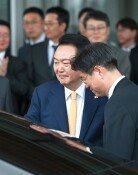Public institutions' management assessment faces criticism
Public institutions' management assessment faces criticism
Posted August. 01, 2017 09:22,
Updated August. 01, 2017 09:31
Starting from this year, public institutions switching non-regular employees to a regular status or hiring new regular workers by reducing work hours will receive a maximum of 10 additional points. In addition, the performance-based annual salary, which the government had introduced to raise management efficiency of public institutions, will be excluded.
The Strategy and Finance Ministry on Monday held a public institution operation committee and voted in favor for the 2017 revised plan for public institution management assessment. As a part of the government's plan to increase public sector hiring, the revised version included a new category to evaluate performance and strategies of public institutions. Ten points were alloted to this category alone, making business assessment score totaling 110.
The government will also introduce flexible quota system under which it will hire a maximum of 2,500 regular employees this year. Flexible quota system refers to reducing work hours and hiring more regular employees without raising labor costs much.
The "relevance of the operation of performance-based annual salary" was omitted from the existing assessment criteria. "Performance-based annual salary will be replaced by existing indicators that measure whether the compensation and welfare systems are reasonably in place," said Koh Jeong-an, evaluation analysis director of the ministry.
Some critics say that the latest government measure fails to increase efficiency and productivity of the public sector and instead prompts reckless management that has often been pointed out as hampering the management of public institutions.
"Before introducing any measures, the government should first assess whether public institutions' current job is still needed after 10 years as well as the appropriate number of manpower," said Kim Tae-yoon, an administration professor at Hanyang University. "Simply increasing regular workers without such assessment will put more burden on the public who has to pay for these public sector workers."
Hee-Chang Park ramblas@donga.com







